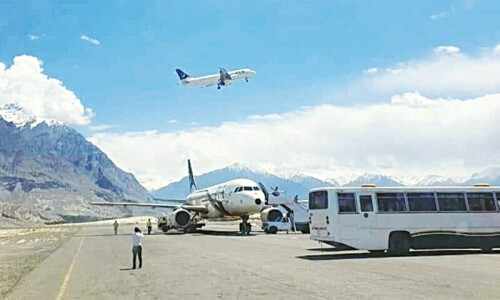ISLAMABAD: The Senate Standing Committee on Finance was informed on Tuesday that Pakistan has no plan to enter the IMF programme and the current account deficit would be met through loans and floating of bonds.
The committee was given an in-camera briefing by State Bank Governor Tariq Bajwa over depleting forex reserves as well as outflow of billions of dollars by various foreign airlines. The SBP official informed the committee about further devaluation of rupee as Rs2 correction is expected.
The country needs $3 billion by the end of June this year — mainly for debt retirement and some other components leading to rising current account deficit.
The government aims to raise $3bn through floating of bonds and papers in international markets, while loans are likely to be obtained from World Bank and the Asian Development Bank.
Talking to the media after the briefing, Committee Chairman Saleem Mandviwala said that imports were up 12 per cent despite tall claims of the government of controlling it through imposition of regulatory duties.
“Whatever reserves we have are loaned money,” he said. During the briefing, the committee was informed that SBP, Civil Aviation Authority of Pakistan and others agencies have no mechanism to control the outflow of reserves.
Foreign airlines have taken out $1.5bn in the form of remittances from Pakistan during the past two year, governor SBP said.
Foreign airlines in 2015-16 earned $1.068bn in Pakistan through sale of tickets out of which they used $300 million for local expenditures and remitted $795bn to their respective countries.
Similarly, foreign airlines earned $1.238bn in 2016-17 and remitted $786m.
Mr Mandviwalla asked SBP and other authorities concerned to take notice of the situation.
“Unfortunately, there is no restriction in Pakistan where foreign airlines operate without any control. Even in India, there is a restriction that foreign airlines can only send 50 per cent of remittances to their countries while they need to invest the remaining amount in host country,” Mr Mandviwalla added.
The meeting also discussed spread of counterfeit notes in the country. The SBP official said that a strategy to detect the fake currency notes was adopted in 2015 under which cash management function was being brought at par with international and regional best practices.
In phase-I of the strategy starting from April 1 2017, banks in 30 cities were given machines for detection of banknotes of Rs500 and above. By July 2018 machines will be introduced for detection of fake notes of Rs100. SBP has also launched an awareness programme to counter the spread fake notes.
Published in Dawn, January 24th, 2018















































